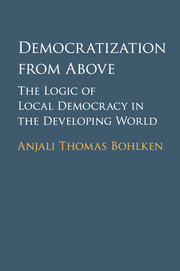Book contents
- Frontmatter
- Dedication
- Contents
- List of Figures
- List of Tables
- Acknowledgments
- 1 The Puzzle of “Democratization from Above”
- 2 The Strategic Logic of Local Democratization
- 3 Local Intermediaries, Local Democratization, and Political Party Organizations in India
- 4 “Constitutionalizing” Local Democracy: Explaining the 1993 National Constitutional Amendments
- 5 Intra-party Competition and Local Democracy in the Indian States: A Statistical Analysis
- 6 Intra-party Competition and Local Governance Reform in Kerala and Tamil Nadu
- 7 Local Politicians as Intermediaries: The Effect of Village-Level Politicians on State-Level Elections
- 8 The Logic of Local Democratization across the Developing World
- 9 Implications of “Democratization from Above”
- 10 Data Appendix: Dataset on Local Democratization Reforms in the Developing World
- Bibliography
- Index
10 - Data Appendix: Dataset on Local Democratization Reforms in the Developing World
Published online by Cambridge University Press: 18 December 2015
- Frontmatter
- Dedication
- Contents
- List of Figures
- List of Tables
- Acknowledgments
- 1 The Puzzle of “Democratization from Above”
- 2 The Strategic Logic of Local Democratization
- 3 Local Intermediaries, Local Democratization, and Political Party Organizations in India
- 4 “Constitutionalizing” Local Democracy: Explaining the 1993 National Constitutional Amendments
- 5 Intra-party Competition and Local Democracy in the Indian States: A Statistical Analysis
- 6 Intra-party Competition and Local Governance Reform in Kerala and Tamil Nadu
- 7 Local Politicians as Intermediaries: The Effect of Village-Level Politicians on State-Level Elections
- 8 The Logic of Local Democratization across the Developing World
- 9 Implications of “Democratization from Above”
- 10 Data Appendix: Dataset on Local Democratization Reforms in the Developing World
- Bibliography
- Index
Summary
This appendix introduces an original dataset on local governance structures and reforms. The dataset consists of 68 countries with a population greater than 10 million in three continents – Asia, South and Central America, and Africa. The unit of analysis is country-year. The earliest a country enters the dataset is in 1945. If the countries enter later than 1945, they enter (a) when data for the country first becomes available or (b) when they are first created or (c) when they become independent. Table 10.1 lists the countries and years included in the dataset and provides a list of the country-years in which reforms have been coded. The data were collected using over 600 secondary sources and government documents.
For each country-year in the dataset, we seek to capture several characteristics of the tiers of government below the national level.We restrict attention to institutions that meet our definition of “local government,” which we define as specific institutions or entities below the national level created by constitutions, legislation, or executive order to enact policy and deliver services to a geographically delineated area. Thus, we focus on the formal local government structure. When a formal structure exists, we ignore traditional structures even if they are mentioned in the constitutional or legal structure. When formal structures do not exist, and if the traditional structures have legal or constitutional recognition, we code the traditional structures. At each tier, we capture the political characteristics of the executive as well as the council or legislative body.
We collect and code data on each tier of a country's subnational government separately and, in particular, capture the electoral status of each tier of government that has units that meet our definition of “local governments” in at least some parts of the country. The status is recorded as of December 31 of the relevant year. Tiers consisting only of administrative structures that do not meet our definition of “local government” are ignored for the purposes of characterizing the electoral status of local government at a given tier.
- Type
- Chapter
- Information
- Democratization from AboveThe Logic of Local Democracy in the Developing World, pp. 249 - 256Publisher: Cambridge University PressPrint publication year: 2016



